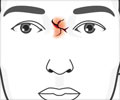How harmless Corynebacterium species, bacterial members of the nasal and skin microbiome, help protect humans from disease has been revealed by scientists.

‘The Corynebacterium species, bacterial members of the nasal and skin microbiome, help protect humans from pathogenic disease.’





Staphylococcus aureus is a common colonizer of the human body. Although, one quarter of the U.S. population live with the bacteria and never get sick, having S. aureus present in the nostrils is a risk for infections that range in severity from mild skin to life-threatening MRSA infections. Research from the Forsyth Institute is providing insight into how harmless Corynebacterium species, bacterial members of the nasal and skin microbiome, help protect humans from disease.
A recent study by senior-author Katherine P. Lemon and first-author Matthew M. Ramsey, along with Dr. Marcelo Freire at the Forsyth Institute, and with Rebecca Gabrilska and Dr. Kendra Rumbaugh from Texas Tech University, shows that when the two bacteria interact, Corynebacterium inhibits the virulence of S. aureus. Further understanding of these interactions is likely to help researchers to develop new treatments for preventing S. aureus infections.
In addition, further research on the interactions between benign members of the human microbiome and bacteria, like S. aureus, that exhibit similar dual characteristics of living in harmony with and causing infections of humans, so-called pathobionts, could lead to the development of novel treatments for other diseases.
"Our research helps set the stage for the development of small molecules and, potentially, probiotic therapies for promoting health by actively managing nasal microbiome composition," says Lemon. "This research identifies a role for Corynebacterium species in suppressing S. aureus virulence, and is an exciting early stage in our exploration of the molecular mechanisms that sculpt the composition of the nasal microbiome and influence colonization by pathobionts. We look forward to an increase in research on commensal-pathobiont interactions within the human microbiome and an ever-increasing understanding of the significance of our beneficial bacteria partners."
Advertisement















